- We recycle
-
- Oil filters
- Oily waste - wiping cloths, absorbents
- Plastic cans
- Contact us
-
Your reliable partner for decades.
Environmentally friendly recycling of waste from the automotive industry and production plants.
We focus on the recovery of individual materials and their return to the circular economy as well as the saving of primary energy.
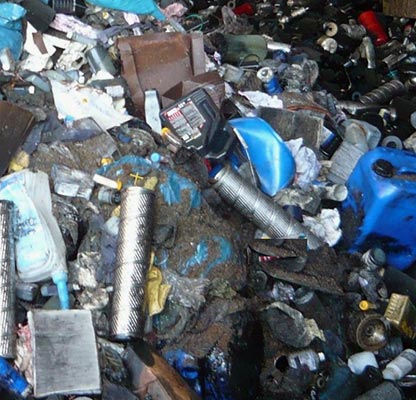
- Oil filter recycling
- We split them into their valuable components: waste-oil, scrap, paper. In the first step, the incoming material is manual examined and foreign material (waste thrown into the wrong bin) removed, which would hinder further treatment in the sorting plant.
- The oil filters are then broken down and separated into their individual components:
The shell becomes metal scrap, which is cleaned in a second step.
The filter paper, made of cellulose or plastic, becomes available as dry substitute fuel.
The containing oil is collected and sent to a waste oil refinery, where group III base oil is produced. - EWC 16 01 07* oil filters 160107
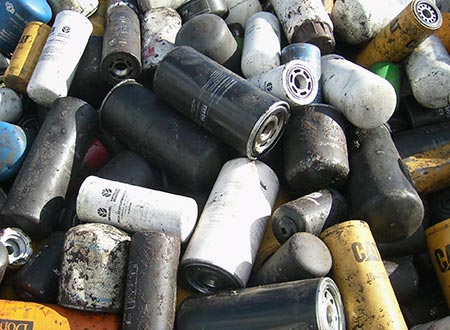
- Recycling of oily waste
- Oil-contaminated waste occur in every car repair shop and in many factories. It is heterogeneous and composed of various types of waste, such as oily rags, wiping cloths,
absorbents, filter materials, oil filters, metal scrap, metal and plastic cans, packaging, protective clothing.
They are contaminated by hazardous substances such as oil or solvents (>55°C flash point).
In our materials recycling facility we do a manual pre-sorting, then the machinery will sort out materials such as iron, non-ferrous metals and plastics one by one.
The scrap is sent to melting furnaces and plastic cans are material recycled if made from HDPE.
Oil filters get sorted out and then treated in a separate line.
The residuals like cloth, paper and tiny plastic-bits are only a fraction of the original quantity. They get grinded and are used as a substitute fuel in a cement kiln.
EWC 15 02 02* absorbents, filter materials (including oil filters not otherwise specified), wiping cloths, protective clothing contaminated by hazardous substances
As we do a material substance recycling, we cannot accept slurry mud, acids, oxidizers, toxic and infectious substances, asbestos, quicksilver, powders.
Since European Waste Code 150202 is rather broad, just mail a few photos of the waste if you are not sure.
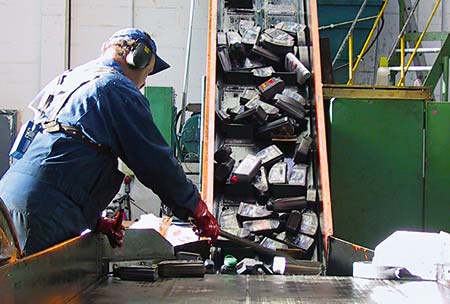
- Plastic can recycling
- Made of HDPE, plastic canisters from a bottle up to the size of a drum can be recycled. We do a manual pre-sort and cans get emptied if necessary. They are then grinded, washed and dried. The HDPE-regrind is sold for regranulating in the EU and used for injection moulding.
- EWC 15 01 10* packaging containing residues of or contaminated by hazardous substances.
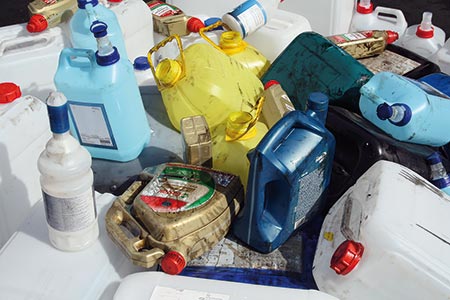
- Contact Us
- EZB Entsorgungszentrum Borken GmbH
Albert-Einstein-Str. 6
34582 Borken
Germany -
+49 (0) 56 82 - 61 14
info@ezb-borken.de
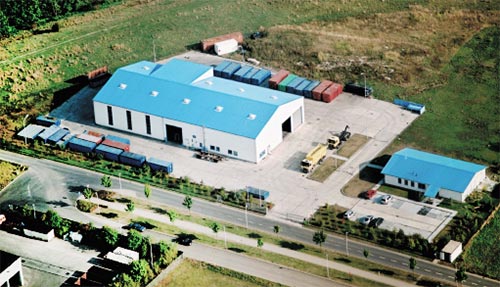
- We recycle waste from various Europe countries and OECD-states in accordance with the Basel Convention. Bulk-waste can be shipped in roller containers, walking-floor trailers and in FEU shipping containers packed in drums on pallets.
- List of EWC-Codes we are authorized to process:
- 08 01 12 waste paint and varnish other than those mentioned in 08 01 11
15 01 01 paper and cardboard packaging
15 01 02 plastic packaging
15 01 03 wooden packaging
15 01 04 metallic packaging
15 01 05 composite packaging
15 01 06 mixed packaging
15 01 09 textile packaging
15 01 10 * packaging containing residues of or contaminated by hazardous substances
15 01 11 * metallic packaging containing a hazardous solid porous matrix (for example asbestos), including empty pressure containers
15 02 02 * absorbents, filter materials (including oil filters not otherwise specified), wiping cloths, protective clothing contaminated by hazardous substances
15 02 03 absorbents, filter materials, wiping cloths and protective clothing other than those mentioned in 15 02 02
16 01 07 * oil filters
16 01 17 ferrous metal
16 01 18 non-ferrous metal
16 01 19 Plastic
16 01 21 * hazardous components other than those mentioned in 16 01 07 to 16 01 11 and 16 01 13 and 16 01 14
17 04 02 Aluminium
17 04 10 * cables containing oil, coal tar and other hazardous substances
19 02 03 premixed wastes composed only of non-hazardous wastes
19 02 04 * premixed wastes composed of at least one hazardous waste
19 12 10 combustible waste (refuse derived fuel)
19 12 11 * other wastes (including mixtures of materials) from mechanical treatment of waste containing hazardous substances
19 12 12 other wastes (including mixtures of materials) from mechanical treatment of wastes other than those mentioned in 19 12 11
- * Hazardous waste according to the Waste Catalog Ordinance (AVV)
Tel: +49 (0) 56 82 - 61 14
Fax: +49 (0) 56 82 - 69 73
info@ezb-borken.de
Entsorgungszentrum Borken
Albert-Einstein-Str. 6
34582 Borken
